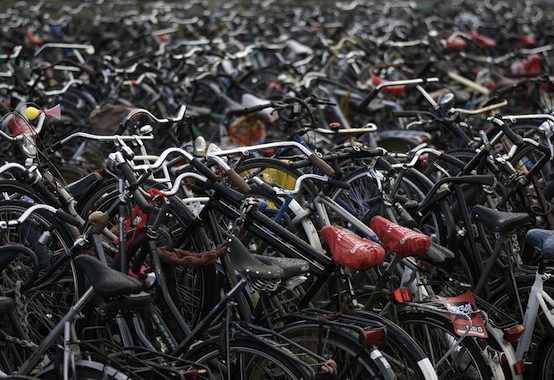The City Is a Home for the Children of Multiculturalism

Jason Peters at Front Porch Republic conceded Mark Signorelli’s right to be discontent with the archetypical Odyssean narrative of the Return Home, a discontent which Signorelli expressed in an essay titled “Going Home Again? Not Likely“:
If I am correct, it seems there is a certain kind of arch-typical narrative that has become quite popular here at FPR, and in some sense, emblematic of its defense of place and home. It is the “Going Home” story, the story of someone rejecting the allures of wealth and status in the big-city, and returning to the fixed traditions of his or her hometown. While such narratives are of great interest, in and of themselves, and while they clearly emerge from the sincere experiences of their authors, I find myself entirely unable to sympathize with them. I suspect, moreover, that, taken together, such narratives tend to distort more about the reality of twenty-first century America than they make clear.
But Peters missed the second part of Signorelli’s remarks, which was a preference for the archetype of Aeneas, a man who, his home having been destroyed, wanders as an exile in search of a place to build a new one. Peters briefly advised persons in Signorelli’s predicament to be as Booker T. Washington and “cast down your buckets where you are,” before defending his own dutiful return to a home still worth caring for.
That advice doesn’t square at all with the story of Aeneas, who spent many years wandering through the Mediterranean: he didn’t settle in the first place he landed, and his first effort to build a city in Crete was rebuked by Apollo. In Carthage, where he could have happily cast down his rusty bucket, his piety compelled him away.
Actually there’s more than one kind of homelessness, and Signorelli touched on only one of them. His sort is the peculiar emptiness engendered by the spirit of modernism, and from which an educated man learns to take some refuge in the wisdom of the classics. “On the street where I grew up,” Signorelli writes, “isolation was the norm. It was the kind of place where people came home from work, turned on the television, and had done with the outside world. The kind of place where next-door neighbors did not know one another’s name.” In response, he says, “one of the ruling impulses in my life since early adulthood has been a desire to get as far away from my hometown as I can.”
There’s another kind of homelessness, never unknown, but now in the United States almost as common as the modern ennui, and that is the problem of having many homes. There are grown men and women raised in homes with parents of different faiths, parents of different races, different nationalities, adults who spent their childhood moving from place to place every four years, crossing state lines and national boundaries. If their parents divorced and remarried they have stepfathers and mothers, each with another new history. These adults marry into again new cultures. Not all of these accumulated homes are worth living in. Some are like Signorelli’s hometown. But others are enduring expressions of community. It isn’t apparent by what rule couples should decide where to settle. They fit neither the departure narrative nor the return narrative.
And I begin with couples as an ethical unit, but marriage itself is a conceptual problem, a fuel to the multicultural fire. Each difference between a married couple increases the difficulty in communication and understanding, increases the basic tension between the insistent demands of their backgrounds. How do you raise your children among their grandparents when your in-laws are in Des Moines and your parents are in Miami? What if your in-laws live in Milan, or New Delhi? How do you raise your children faithfully when you, a Lutheran, can’t receive the Eucharist of your Roman Catholic wife?
I’m not discussing multiculturalism (or better, cultural pluralism), where communities with radically different cultures lead separate existences from neighborhood to neighborhood, and for which the problem is protecting the heritage of local and national history and law from the imported doctrines of an alien people who demand provision for their robust dissimilarity. I’m discussing the moral duties of the people who live in the borders between those communities. Those borders grow more complex year on year, strange combinations of tribal loyalties overlap, and the population living in them grows larger and larger.
In the absence of a series of friendly Apollonian soothsayers, it takes people a long time to work out how to solve the riddles of their moral duties. There’s no doubt humans have a common desire for home: some people learn to locate it in their family, some in a landscape, some in a club, some in a profession with a few friends. The fullest and most beautiful expression of home is larger than any one of these things, but for a child of multiculturalism the search for that home is difficult and can cause massive unhappiness.
There is a natural institution which can harbor and endure this sort of cultural anarchy, even putting it to good use: the city. Intercollegiate Review‘s Danielle Charette observed that “conservatives often use “cities” as a stand in for what is wrong in America: poverty, family breakdown, and crony capitalism. It’s true that those issues tend to concentrate more in urban zip codes. But it’s also true that cities are a magnetic testament to the human desire to congregate and experiment.” That embrace of experiment offers an endless supply of new beginnings, a place where strange ideas are constantly crashing into one-another, a place to build a half-way home while you sift through your soul to find the seeds of a more enduring piety.
Comments